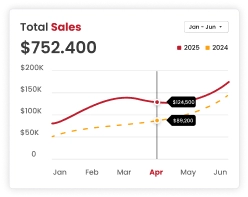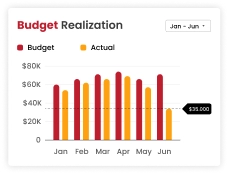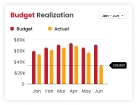What is ERP Software?
ERP, or Enterprise Resource Planning, is a software system that helps businesses manage and automate core functions like finance, HR, inventory, and procurement. It works by integrating these processes into a single platform, so teams can operate with shared data and clear visibility.
By connecting departments in real time, ERP software eliminates silos and manual work. This allows your business to respond faster, make smarter decisions, and scale with confidence.
Modern ERP systems also come with AI tools that predict demand, automate workflows, and generate accurate reports. It turns day-to-day operations into a competitive advantage.
Benefits of ERP Software
ERP systems offer more than just digital convenience, but it drives real business value. From daily operations to long-term planning, ERP software brings structure and clarity to your entire organization. Below are some of the most impactful benefits businesses gain when adopting an ERP system:
1. Cost Reduction
ERP software helps reduce operational costs by improving how your business allocates resources. It gives you better control over inventory levels, purchasing patterns, and supply chain activities, minimizing overstocking, understocking, and material wastage.
With fewer manual processes, companies also save time and labor. Tasks like invoicing, payroll, or procurement requests that used to require full-time attention can now be done automatically, resulting in measurable efficiency gains and lower overhead costs
2. Real-Time Insights
Modern ERP systems provide live data dashboards that reflect your latest sales, inventory, and financials. This real-time visibility helps teams catch problems early, track KPIs, and make quick, informed decisions backed by reliable numbers.
Whether you're reviewing stock movements or evaluating monthly revenue, ERP software ensures your data is always accurate and up to date. It gives you a strategic edge in fast-moving markets.
3. Scalability
As your business grows, your processes need to scale with it. ERP platforms are designed to support expansion, whether it’s adding new branches, product lines, or business units, without compromising control or visibility.
You can start with the core modules you need today and easily add more over time. This flexibility allows growing businesses to adapt to new demands while maintaining operational consistency across all departments
4. Customization
Every business has unique workflows, and ERP software can be tailored to fit yours. Whether it's setting custom approval paths, integrating with third-party apps, or aligning reports with your internal KPIs, a customizable ERP system lets you work the way you want.
This tailored setup improves user adoption, reduces the need for manual workarounds, and ensures the system truly supports your day-to-day operations, rather than forcing you to change them.
5. Improved Collaboration
ERP software connects departments through shared data and automated workflows. All employees, from finance and procurement to HR and sales, can access the same accurate, updated information in one integrated platform.
This transparency reduces miscommunication, speeds up cross-team approvals, and creates a more coordinated work environment. Instead of relying on email chains or disconnected tools, teams stay aligned with real-time access to what matters most.
6. Enhanced Productivity
One of the biggest advantages of ERP software is its ability to automate repetitive, time-consuming tasks, like data entry, order tracking, and report generation happening in the background. It’s freeing up employees to focus on work that actually drives business value.
With fewer manual errors and less time spent on low-impact tasks, your teams can get more done with less stress. This boost in productivity not only improves individual performance but also accelerates the entire company’s operational flow.
7. Regulatory Compliance
Staying compliant with government and industry regulations can be challenging, especially as requirements evolve. ERP software simplifies this by maintaining proper records, audit trails, and standardized reporting formats that align with regulatory standards.
Whether it's tax documentation, labor laws, or product traceability, an ERP system helps you stay organized and ready for inspections or audits. You get peace of mind knowing your operations are running within legal and ethical boundaries.
Best ERP Software for Singaporean Businesses Recommendation
With so many ERP solutions available in the market, choosing the right one can feel overwhelming. To help you make a more informed decision, here’s a closer look at some of the top ERP software options for businesses in Singapore.
1. HashMicro ERP Software

HashMicro is one of the top ERP software providers in Singapore, trusted by over 3,000 companies across various industries. Known for its robust and scalable system, HashMicro offers a complete suite of business software to help organizations manage their operations more efficiently.
The ERP software includes a wide range of modules, from accounting and inventory to CRM, HRM, and procurement. Whether you’re in retail, construction, manufacturing, or professional services, it can be tailored to suit specific business requirements.
HashMicro also features Hashy AI, an integrated smart virtual assistant that brings automation to the next level. With just a simple chat command, users can access reports, approve requests, or get business updates, anytime and anywhere, right from a chatbox.
In addition, Singaporean businesses can benefit from the CTC Grant, which covers up to 70% of ERP implementation costs. HashMicro also provides a free demo so businesses can explore the right setup before making a commitment.

Pros

Complete features with a user-friendly interface.

Highly customizable for specific needs and workflows.

Integrasi dengan perangkat biometrik dan absensi face-recognition

Seamless integration with other modules and systems.

Unlimited users without additional user fees.

Provides lifetime after-sales service and maintenance by expert teams.

Cons

Free demo registration queue may take time due to high demand.

Not suitable for small scale businesses due to its complex features.

Features

Built-in BI (Business Intelligence): Gain actionable insights with real-time dashboards that highlight key performance trends and help you track business goals effortlessly.

Mobile Apps: Empower your team to work remotely with mobile access to ERP tools for faster decisions and task completion, even on the go.

WhatsApp Integration: Handle approvals, get updates, and communicate with clients or team members directly via WhatsApp, all within the ERP ecosystem.

Access-Level Control: Assign roles and manage data access securely, so each employee sees only what they need based on their responsibilities.

AI-Generated Report & Explainer: Instantly receive smart, easy-to-understand reports that explain your data. No manual compiling or interpretation needed.

Flexible Hosting Methods: Choose from cloud, on-premise, or hybrid deployment options to match your business’s IT policy and infrastructure.

Multi-Language Support: Operate your ERP system in your preferred language, ideal for diverse teams and businesses working across borders.
2. Oracle ERP Software
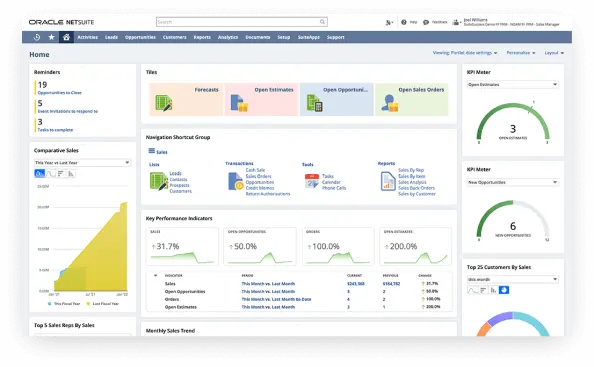
Oracle ERP is a cloud-based enterprise resource planning system designed to manage core business functions such as finance, procurement, project management, and compliance. It is part of Oracle's larger suite of business applications and is commonly used by medium to large enterprises globally.
Like most ERP platforms, Oracle ERP offers integrated modules and automation capabilities to help businesses improve efficiency and data accuracy. It supports multi-entity operations and is often considered for companies with complex reporting needs or global operations.

Pros

Customizable features cater to diverse company needs

A cloud-based system that ensures accessibility and scalability

Integrated CRM module

Cons

Additional expenses include license fees, integration, setup, and training

Database accessibility is limited to specialized IT teams, restricting general user access

Features

Financial Management

Procurement

Project Portfolio Management

Risk Management
3. SAP HANA
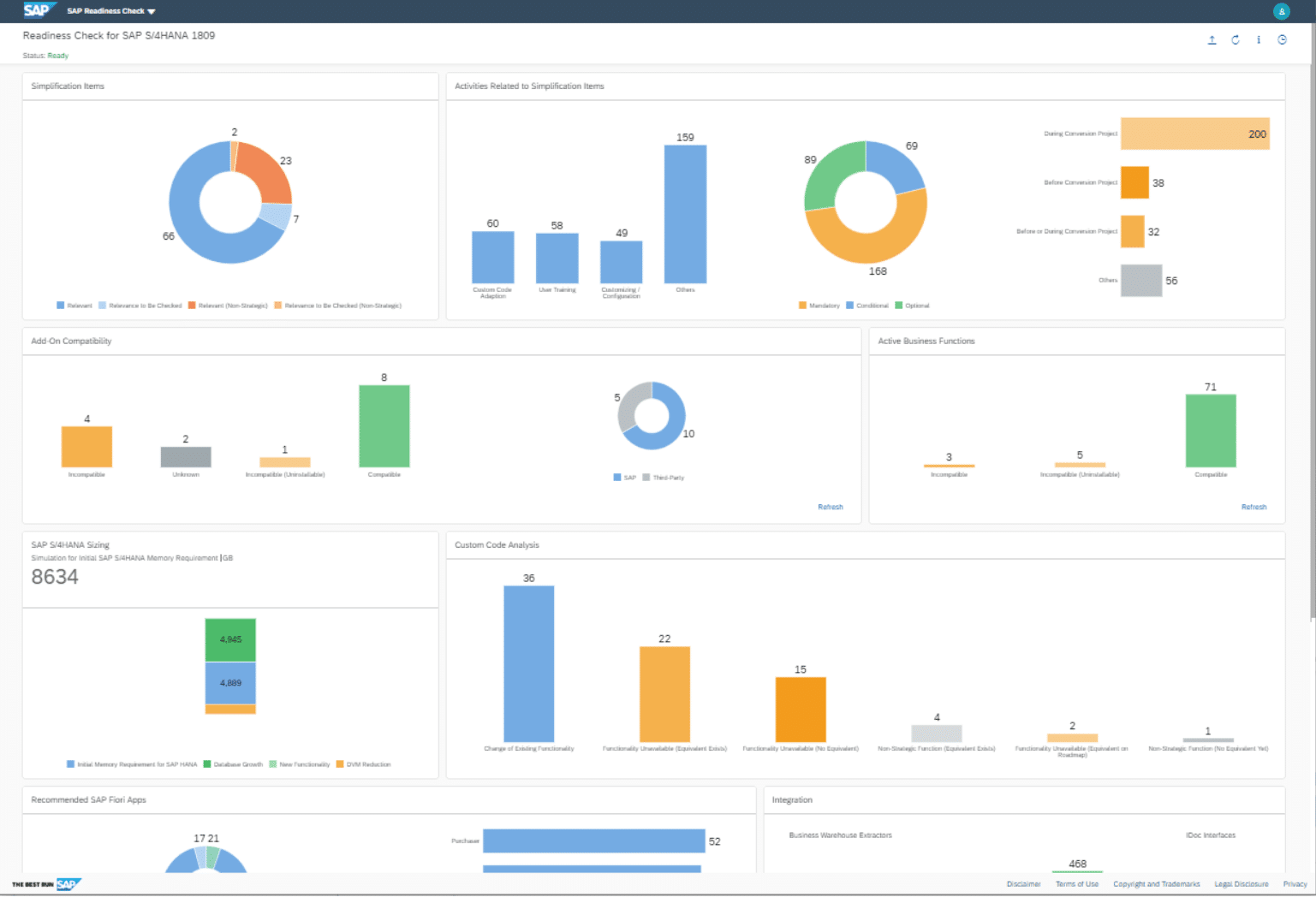
SAP HANA is an in-memory ERP platform developed by SAP to help businesses process large volumes of data in real time. It supports core business functions like finance, logistics, and human resources while also offering capabilities for advanced analytics and data integration.
This ERP system is often adopted by companies that require high-performance computing, especially those operating in complex industries such as manufacturing, energy, and telecommunications. Like most ERP solutions, it combines automation, reporting, and business intelligence tools in a unified environment.

Pros

SAP HANA offers a modern user interface.

Integration capabilities with other business applications.

Caters to various business aspects

Cons

Additional expenses for licensing, subscription, and application support can escalate the total implementation cost significantly

Can be difficult to customize without technical support

Features

Real-Time Analytics

Financial Planning

Supply Chain Management

Human Capital Management
4. Microsoft Dynamics 365

Microsoft Dynamics 365 is a cloud-based suite that combines ERP and CRM capabilities to support business processes like sales, finance, operations, and customer service. It integrates seamlessly with other Microsoft products, making it a practical choice for businesses already using tools like Office 365 or Azure.
Like other ERP systems, Dynamics 365 helps organizations improve productivity through automation, centralized data, and customizable workflows. It is suitable for both mid-sized and large businesses across various industries.

Pros

The modular design allows businesses to select only the applications they need

Built-in analytics powered by AI and machine learning

Being cloud-based ensures accessibility from anywhere

Cons

Implementing Dynamics 365 can be intricate, requiring expert guidance

New users may find the interface complicated

The initial setup and ongoing costs may be substantial

Features

Finance & Operations

Customer Service

Supply Chain Management

Sales Management
5. Odoo ERP Software
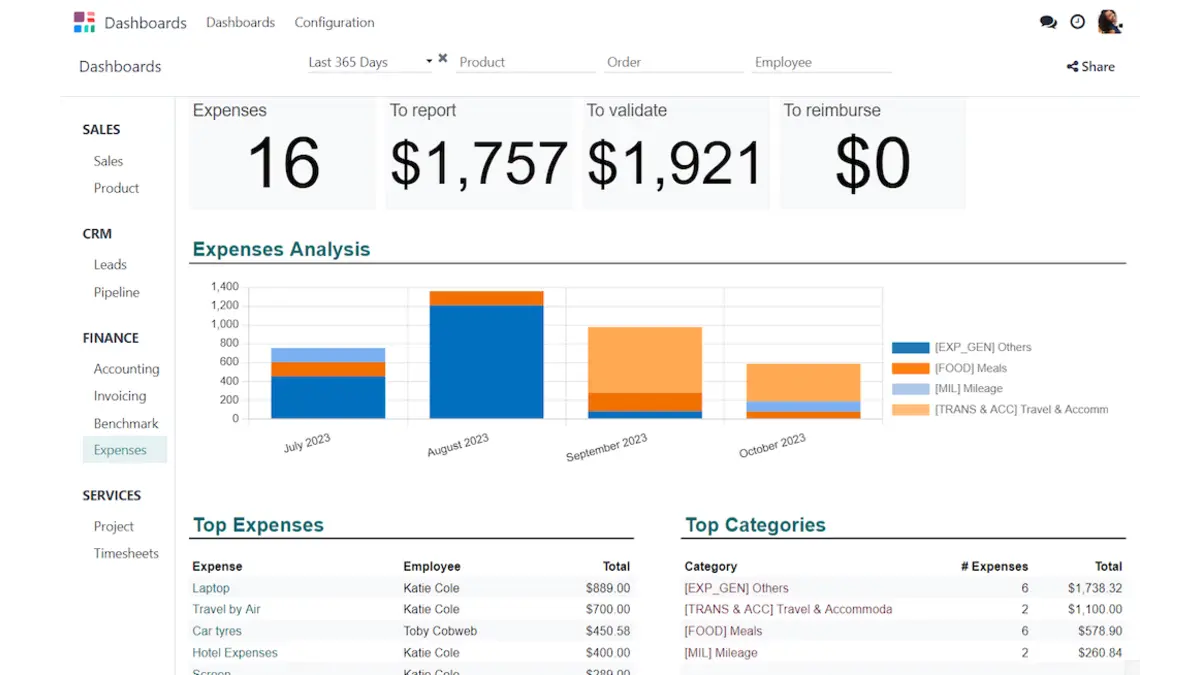
Odoo is an open-source ERP platform that offers a wide range of business applications covering areas like accounting, inventory, sales, HR, and more. It’s known for its modular structure, allowing businesses to install only the features they need and scale over time.
As with many ERP systems, Odoo provides integrated tools to help streamline workflows and improve visibility across departments. It caters to small and medium-sized businesses but is also used by some larger enterprises due to its flexibility.

Pros

Odoo ERP System Singapore offers a user-friendly reporting system

Customizable with integration capabilities with existing tools

Integrated modules for business management

Regular system updates

Cons

Potential complexity in configuring and customizing modules

May require training for full utilization of all features

Features

Accounting

Inventory Management

CRM

HR Management
How to Choose The Best ERP Software
Choosing the right ERP system can be a game-changer for your business. Here are some key tips to help you decide, and why many Singaporean businesses choose HashMicro:
1. Understand Your Business Needs: Start by identifying the core processes you want to improve. Finance, procurement, inventory, HR, or all of them. The ERP you choose should directly address your specific operational pain points.
2. Check for Local Compliance: Ensure the software complies with Singapore’s regulations, such as IRAS tax rules or CPF payroll standards. A good ERP system should help you stay audit-ready and locally aligned.
3. Look for Customizability: Your business is unique, so your ERP should be flexible enough to match. Choose a platform that lets you tailor workflows, fields, and reports to your needs..
4. Evaluate Ease of Use and Support: A complex system can slow you down. Make sure the ERP has a clean interface and reliable local support. HashMicro offers an intuitive UI and a responsive support team based in Singapore.
5. Prioritize Scalability and Integration: Pick an ERP that grows with your business and integrates well with other tools. Like supporting multi-location setups and comes with ready-to-use integrations, including WhatsApp and banking systems.
Conclusion
ERP software is no longer just a tool—it’s a strategic investment that helps businesses unify operations, improve efficiency, and make smarter decisions. Whether you're managing inventory, finance, HR, or customer relationships, the right ERP system can drive long-term growth and resilience.
HashMicro stands out as a trusted ERP provider in Singapore, offering a flexible, AI-powered platform tailored for businesses with complex operations. With customizable modules, mobile access, and seamless integrations, it’s designed to support your specific workflows while keeping everything aligned and compliant.
Ready to explore how ERP can transform your business? Try HashMicro through a free demo and see how easy it is to get started.
